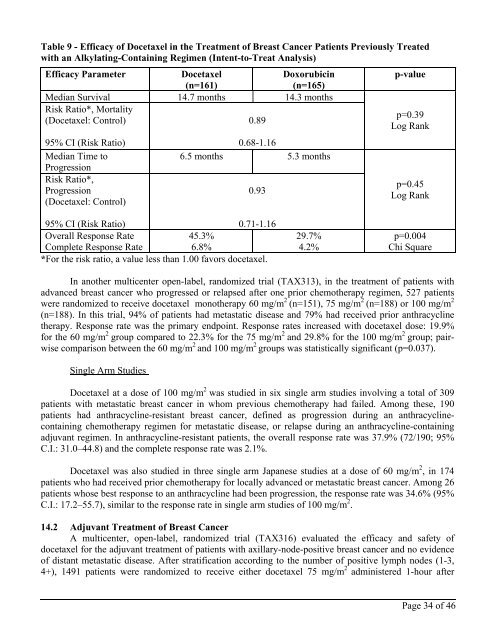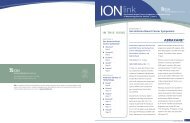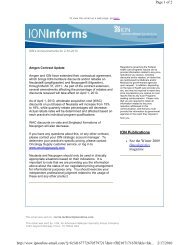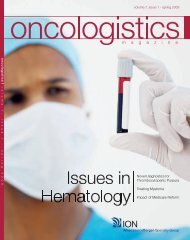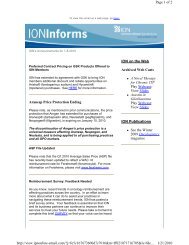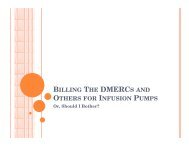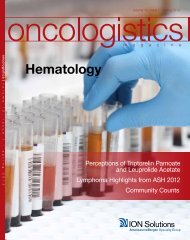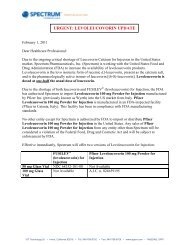Single Vial Docetaxel Injection - ION Solutions
Single Vial Docetaxel Injection - ION Solutions
Single Vial Docetaxel Injection - ION Solutions
Create successful ePaper yourself
Turn your PDF publications into a flip-book with our unique Google optimized e-Paper software.
Table 9 - Efficacy of <strong>Docetaxel</strong> in the Treatment of Breast Cancer Patients Previously Treated<br />
with an Alkylating-Containing Regimen (Intent-to-Treat Analysis)<br />
Efficacy Parameter<br />
<strong>Docetaxel</strong><br />
(n=161)<br />
Doxorubicin<br />
(n=165)<br />
p-value<br />
Median Survival 14.7 months 14.3 months<br />
Risk Ratio*, Mortality<br />
(<strong>Docetaxel</strong>: Control)<br />
0.89<br />
95% CI (Risk Ratio)<br />
Median Time to<br />
Progression<br />
Risk Ratio*,<br />
Progression<br />
(<strong>Docetaxel</strong>: Control)<br />
0.68-1.16<br />
6.5 months 5.3 months<br />
0.93<br />
p=0.39<br />
Log Rank<br />
p=0.45<br />
Log Rank<br />
95% CI (Risk Ratio)<br />
0.71-1.16<br />
Overall Response Rate<br />
45.3%<br />
Complete Response Rate<br />
6.8%<br />
*For the risk ratio, a value less than 1.00 favors docetaxel.<br />
29.7%<br />
4.2%<br />
p=0.004<br />
Chi Square<br />
In another multicenter open-label, randomized trial (TAX313), in the treatment of patients with<br />
advanced breast cancer who progressed or relapsed after one prior chemotherapy regimen, 527 patients<br />
were randomized to receive docetaxel monotherapy 60 mg/m 2 (n=151), 75 mg/m 2 (n=188) or 100 mg/m 2<br />
(n=188). In this trial, 94% of patients had metastatic disease and 79% had received prior anthracycline<br />
therapy. Response rate was the primary endpoint. Response rates increased with docetaxel dose: 19.9%<br />
for the 60 mg/m 2 group compared to 22.3% for the 75 mg/m 2 and 29.8% for the 100 mg/m 2 group; pairwise<br />
comparison between the 60 mg/m 2 and 100 mg/m 2 groups was statistically significant (p=0.037).<br />
<strong>Single</strong> Arm Studies<br />
<strong>Docetaxel</strong> at a dose of 100 mg/m 2 was studied in six single arm studies involving a total of 309<br />
patients with metastatic breast cancer in whom previous chemotherapy had failed. Among these, 190<br />
patients had anthracycline-resistant breast cancer, defined as progression during an anthracyclinecontaining<br />
chemotherapy regimen for metastatic disease, or relapse during an anthracycline-containing<br />
adjuvant regimen. In anthracycline-resistant patients, the overall response rate was 37.9% (72/190; 95%<br />
C.I.: 31.0–44.8) and the complete response rate was 2.1%.<br />
<strong>Docetaxel</strong> was also studied in three single arm Japanese studies at a dose of 60 mg/m 2 , in 174<br />
patients who had received prior chemotherapy for locally advanced or metastatic breast cancer. Among 26<br />
patients whose best response to an anthracycline had been progression, the response rate was 34.6% (95%<br />
C.I.: 17.2–55.7), similar to the response rate in single arm studies of 100 mg/m 2 .<br />
14.2 Adjuvant Treatment of Breast Cancer<br />
A multicenter, open-label, randomized trial (TAX316) evaluated the efficacy and safety of<br />
docetaxel for the adjuvant treatment of patients with axillary-node-positive breast cancer and no evidence<br />
of distant metastatic disease. After stratification according to the number of positive lymph nodes (1-3,<br />
4+), 1491 patients were randomized to receive either docetaxel 75 mg/m 2 administered 1-hour after<br />
Page 34 of 46


